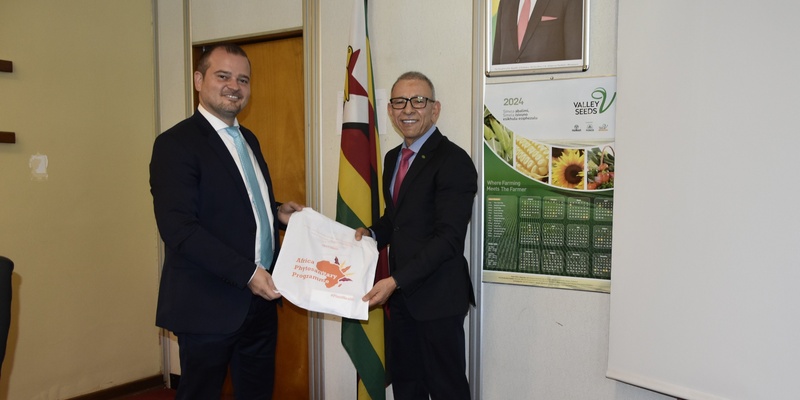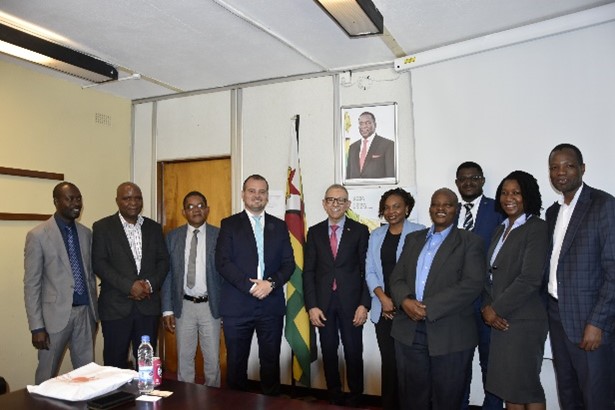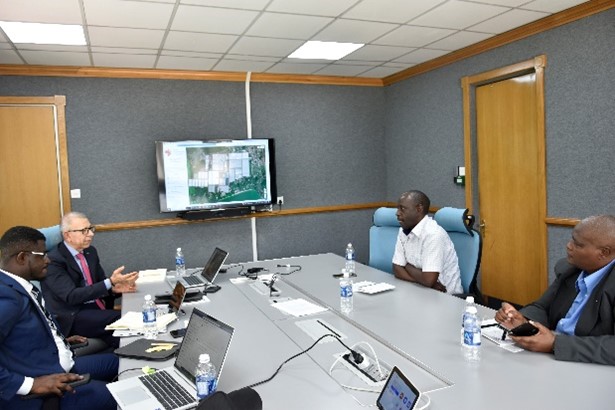“We are ready.” Zimbabwe welcomes implementation of Africa Phytosanitary Programme, promotion of international plant health standards
Posted on Thu, 21 Mar 2024, 13:57

©FAO/Anita Tibasaaga
Vangelis Peter Haritatos (left), Deputy Minister of Lands, Agriculture, Fisheries and Rural Development receives materials on APP from Osama El-Lissy (right), IPPC Secretary.
Harare, 14 March 2024. The Ministry of Lands, Agriculture, Fisheries and Rural Development of the Republic of Zimbabwe has pledged its commitment to support the implementation of the Africa Phytosanitary Programme (APP) in the country.
APP is an initiative of the International Plant Protection Convention (IPPC), designed to transform the technical capacity of Africa’s phytosanitary personnel in all 54 countries by equipping national plant protection organizations (NPPOs) with science-based approaches, advanced technology, and tools to monitor, prevent, detect, and ultimately manage significant plant pests and diseases that threaten food security, the environment, and economic growth. By enhancing the continent’s phytosanitary capacity, APP will help African countries implement international phytosanitary standards, eliminate hunger and reduce poverty by raising economic growth through agricultural production, productivity and trade.
Speaking during a high-level meeting with a delegation from the IPPC Secretariat to discuss the status of implementation of the programme, Vangelis Peter Haritatos, Deputy Minister of Lands, Agriculture, Fisheries and Rural Development noted that despite the challenges affecting the country’s agriculture, Zimbabwe boasts of a large pool of technical experts in phytosanitary and agricultural fields, with the necessary competencies to use modern scientific approaches and technology provided under APP, to manage pests and reduce their impact on food and income security.
“Thank you, IPPC for bringing this programme to Zimbabwe. Pests and diseases contribute a substantial amount of loss to our agricultural produce and present a real threat to our ability to benefit from the African Continental Free Trade Area (AfCFTA)”, said Hariratos.
Hariratos emphasized the importance and urgency of modernizing the country’s surveillance [of pests] and using technology for data collection in the field, as this minimizes inefficiency from double handling and limits wastage of resources and time associated with using paper forms.
“Human capital has always been our strength and some of the neighbouring countries have invited experts from Zimbabwe to conduct training in their countries”, he added.
The Deputy Minister also commended the Food and Agriculture Organization of the United Nations (FAO) for its strong partnership and acknowledged the IPPC for developing and promoting international standards for phytosanitary measures (ISPMs), which the country follows strictly to protect its “biosafety, food safety, agriculture value chains and trade.”
During the meeting, Osama El-Lissy, IPPC Secretary, explained the rationale and vision of APP, which is part of the IPPC’s global phytosanitary programme. He noted that amidst climate change, pests are causing significant damage to crops in their quest to adapt to changing environmental conditions, worsening global hunger. Pests cause between 20-40 percent crop loss globally every year and about USD 220 billion in economic losses.
“I am pleased to hear that Zimbabwe has the technical personnel to support implementation of APP. The IPPC Secretariat is optimistic that the programme will help Zimbabwe and the other 10 countries in the pilot phase, to deal with pests in a transformational way”, said El-Lissy.
“The IPPC will provide science, technology, and field supplies such as traps and lures to support regular monitoring, accurate data capture and reliable information to facilitate prompt and sound decision-making on managing pests before they cause economic damage, he added.
The meeting was also attended by officials from the FAO Representation in Zimbabwe and the Zimbabwe Plant Quarantine Services Institute (PQSI).


©FAO/Anita Tibasaaga
Zimbabwe, food security first
Ensuring food security, improving food self-sufficiency and retaining Zimbabwe’s regional breadbasket status is one of the priorities of Zimbabwe’s National Development Strategy 1 (NDS1). The NDS1 aims to ensure high, accelerated, inclusive and sustainable economic growth, as well as socio-economic transformation and development as it moves towards an upper middle-income society status by 2030. Zimbabwe envisions trebling agriculture trade through improved access and competitiveness of quality agriculture products and value addition on the domestic and international markets. Effectively dealing with plant pests, whose occurrence and distribution is increased by climate change, is critical for Zimbabwe’s pursuit of food security and economic growth.
“Having information at our fingertips is very important. This [programme] is music to our ears, and we endorse the support you are giving us”, said Deputy Minister Hariratos.

